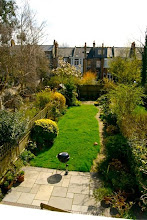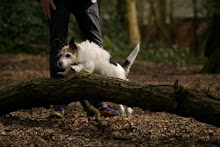I see dovegreyreader has come up with a good reading trail for "Daphne" -- so I thought I might add a bit more information to the background of the book, over here. One of the strands to the story that I found most fascinating -- and utterly consuming, during the research -- was the relationship between the Du Maurier family and J.M Barrie.
Barrie was the author of Peter Pan, and a huge quantity of other plays and novels. His writing was inspired by, and threaded through, the Du Maurier family, to quite an extraordinary degree. Daphne's father, the actor-manager Sir Gerald du Maurier, played a great many roles in Barrie's plays, and his fame and fortune was in part the result of this. Daphne once wrote that Barrie understood her father better than anyone else did, and that he used this knowledge to create the plays in which Gerald starred.
Indeed, Gerald met Daphne's mother, Muriel, when they starred opposite one another in Barrie's play, "The Admirable Crichton"; and Gerald went on to appear as the first Captain Hook and Mr Darling in "Peter Pan", a story that was inspired by Daphne's cousins, the five Llewelyn Davies boys, whom Barrie subsequently adopted after they were orphaned. Their father, Arthur, had died of cancer just before Daphne was born in 1907, and their mother, Sylvia, who was Gerald's sister, and a celebrated Edwardian beauty adored by Barrie, also succumbed to cancer, three years later; a tragedy retold in the Hollywood movie, 'Finding Neverland', with Kate Winslet playing Sylvia and Johnny Depp as J.M Barrie.
The true story was rather darker than the Hollywood version, as I'm sure you can imagine. I live close to the graveyard in Hampstead where the Du Mauriers and Llewelyn Davies are buried, and their gravestones show that three of the five boys -- The Lost Boys -- died in tragic circumstances. George, the oldest, was killed in the trenches of the First World War, soon after he had left school. Michael drowned as an undergraduate at Oxford. And Peter -- the namesake for Peter Pan... well, his story is interwoven with Daphne's in my book, and his death was a terribly sad one.
Tuesday, 1 April 2008
Subscribe to:
Post Comments (Atom)









11 comments:
I must confess to adoring Finding Neverland. Soon after I first watched it I read up on it on the internet and found what you just said - that the actual story wasn't exactly so. Yet it was as interesting or more. What happens after the movie ends - with all those tragic deaths, etc. - is terribly sad.
J.M. Barrie and the Lost Boys has been on my wishlist for ages (I wished I had it as handy as dovegrey reader when I read Daphne).
Perhaps you could someday post here a picture of the du Maurier graves and the little cemetery? I remember wanting to see it when I read about it in Daphne as well.
Cristina.
I found the aspect of Daphne relating to Barrie and the Llewelyn Davies family fascinating. I hadn't realised that Sylvia was a du Maurier or that there as such a close theatrical link. I loved Barrie as a student, especially 'Dear Brutus' which is another work that has a lot to say about identity and how much of who we are is related to who we would like to be.
Cristina -- that's a good idea. I'll definitely post a picture
(when I can get the digital camera back from my teenage sons).
Ann -- I'm interested to hear more about your thoughts on 'Dear Brutus', as it's rarely read, let alone performed, nowadays. It was a play that had a huge impact on Daphne when she watched it as a child -- she described seeing her father on stage, playing Will Dearth, and she found herself bursting into tears. I'm not sure what was the trigger for her grief -- Gerald's biographer, James Harding, writes this:
"In no other role did he probe so deep within himself or so ruthlessly to picture the desolation of failure. Daphne at the age of ten came to see the play and was so affected she had to be led out in tears.
"The supreme moment in Gerald's performance came when he realised he had lost his dream daughter and broke into a sob..."
Actually, given what you say in 'Daphne' about the relationship between father and daughter and the almost incestuous feelings he seems to have had for her the fact that he played Dearth is very interesting indeed. I hadn't realised that. I've never seen the play performed but the joy of the second act where Dearth and Margaret, the dream daughter he has never had, explore together in the woods comes sparkling off the page. The emotion is tangible, absolutely charged. I never once questioned the reality of the relationship, he is the ideal father, someone a daughter would never want to leave. Perhaps Daphne could not contemplate the loss that both father and daughter suffer when the characters have to return to the real world and try and find a way forward. It may almost have been like a small death to her. I must go away and think about this some more. Isn't it fascinating?
That is such a fascinating interpretation. You've definitely shed new light for me on this aspect of their relationship -- and also, on the blurring of the boundaries in the relationship between Gerald and Daphne. She once said, "I was born into a world of make believe and pretence" -- and "Dear Brutus" would be inextricably bound up in that.
Looking forward to hearing more on this from you!
There are so many layers to this story aren't there? It feels like you could go on for ever unpicking the links and the consequences of the relationships.
Yes, you're right -- and it bears repeated examination. I think there are a myriad different ways to tell this story. Like Cristina, I enjoyed Finding Neverland -- in fact, I wept copiously. But there are far darker versions, including the one I've told in "Daphne".
How fascinating!! I had no idea that the Barrie family were involved with the Du Mauriers (I've never seen Finding Neverland either).
There's a very good website that's worth checking out -- I've linked to it -- about J.M. Barrie and the Du Mauriers.
Justine, I think your reading list for writing Daphne will be even more fascinating. I very nearly bought the Letters to Oriel Malet today because apparently they reveal another side to Daphne.
The Oriel Malet book is really interesting. I'll post the reading list tomorrow...
Post a Comment